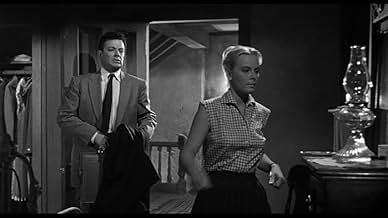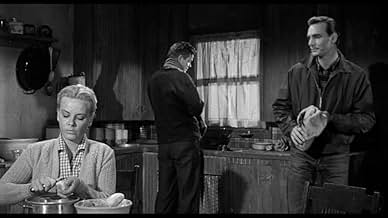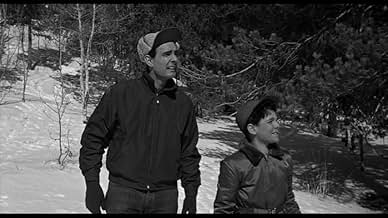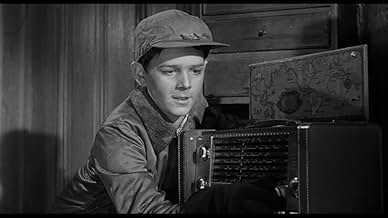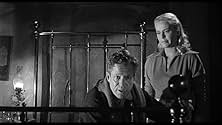Ajouter une intrigue dans votre langueAfter being wounded by a bullet, bank robber Charlie Blake seeks shelter with his gang at his brother's mountain retreat. There he rekindles his romance with his brother's wife and reconnect... Tout lireAfter being wounded by a bullet, bank robber Charlie Blake seeks shelter with his gang at his brother's mountain retreat. There he rekindles his romance with his brother's wife and reconnects with the boy he believes is his son.After being wounded by a bullet, bank robber Charlie Blake seeks shelter with his gang at his brother's mountain retreat. There he rekindles his romance with his brother's wife and reconnects with the boy he believes is his son.
- Réalisation
- Scénario
- Casting principal
Avis à la une
Dan Duryea is a writer who has much wrong with him. Hostile to the music on the radio (wait till you hit the '60's man!), whilst his ailing body and sporadic whines are the closest things to strong drink permitted in the isolated house he shares with dutiful wife, Jean Wallace and teenage son, David Stollery. It's difficult to warm to dismal Dan. There is a blanket of snow outside and he presides over a no less icy mood indoors. The arrival of his brother, Cornel Wilde, shot up and on the run following a robbery, with accomplices, bully boy Steven Hill, who resembles William Bendix after a six week course at Slimming World and his moll, blonde bombshell, Lee Grant, plunge the temperature even further.
A hostage in her own home, Wallace is charged with removing the bullet from Wilde's leg. A painstaking undertaking lightened by the backdrop of big band jazz. Wilde's relief at no longer having a bullet in quickly subsides with a news bulletin revealing that the cop shot during the robbery has since died.
With a visit from handyman Dennis Weaver falling into the "Phew that was a close one!" category and the law drawing ever nearer, Wilde presses his nephew into guiding them over the snow veiled mountain to the highway, whilst Wallace is...er..a bit tied up.
Soon Grant experiences a painful fall (told her not to wear those high heels!) and has a suspected broken ankle. Ah, the 1950's, the age of chivalry. After briefly discussing her sorry plight the two men decide....to leave her to the elements, flinging her a few dollars to become soggy in the snow for company. Cold comfort, literally, as she can't walk, there isn't a shop within miles and at this time Amazon was just a river.
On his directorial debut, working with a small, but eminently capable cast, Wilde hits a middle point where 'On Dangerous Ground' meets 'The Desperate Hours.' He conjures desolately noirish motifs from the unconventional settings, successfully pursuing themes of isolation, loneliness and desperation.
These are promising elements but the drama really fails to gel, because Wilde is too nice to project real menace, while the real menace, Hill, is never given the kind of emotional close- ups that would establish his danger. Instead, he just sort of prowls around in the background. Actually, the movie's mainly about the burgeoning Wilde-Stollery relationship, where you have to read between the lines about the actual source of the dog collar. Then too, it's Stollery stealing the movie in a poignantly shaded performance, while Wilde unwisely spends too much time showing off his manly chest.
The second half moves to the great outdoors, where the gang tries to escape the approaching cops by fleeing over the snowy mountains. Here we get some suspense as the figures are reduced to little dots on a great white landscape. Now they're struggling not only with each other, but with an overwhelming nature. This part plays out in fairly effective fashion, though I never did figure out what exactly the errant snowplow was doing on an anonymous mountainside.
All in all, it's an uneven, sometimes awkwardly filmed movie, whose chief virtue may be what it doesn't tell the audience about the relationships instead of what it does. And kudos to producer Wilde for giving the blacklisted Lee Grant a minor part as the gang's moll, at a time when the best this fine actress could get is TV walk-ons. My guess is Wilde took on too much for a first-time filmmaker (director-producer-star) and would have been advised to hire an accomplished director. But then this was a low-budget effort, (the interiors were filmed in a TV studio!). Wilde's real filmmaking talent would show up later in the acclaimed Naked Prey (1966), so I guess this was something of a learning experience.
This should have been more claustrophobic with 6 people cooped up in a house in a snow storm, but the script handles this nicely. The film gives the appearance of being an inexpensive production; yet, it makes the most of what is there in set, actors, etc. Wilde does a credible job of directing. Elmer Bernstein's score is a plus. The ending, however, is totally unsatisfactory, obviously bowing to conventions of the mid 50s when uncompromising films were not the norm.
In this film Wilde is a nominal bad guy. A charming bank robber at least as far as the women are concerned. At least as far as Jean Wallace is concerned as they had a son together, but it was Wilde's older brother Dan Duryea, a would be novelist who married Wallace and carried on the fiction that he was David Stollery's father. They live in a remote area of one of our Rocky Mountain states.
Wilde's just robbed a bank and he and his two surviving accomplices, Lee Grant and Steven Hill head for the Duryea-Wallace farm as a hideout and to recuperate as Wilde was shot in the holdup. Of course while they're there Duryea spots some sparks between Wilde and Wallace.
Wilde who directed as well as played the lead got some complex emotions out of his players. He's a bad guy, but still charming in his own way and protects his family from what a psychotic Steven Hill might do. Wallace is still in love with Wilde, but knows full well what a charming liar he is. Duryea is a decent, but inadequate man who knows he's been a failure far from his usual variety of psychotic villains.
Before Kirk Douglas's more celebrated breaking of the blacklist with hiring Dalton Trumbo for the Spartacus screenplay, Wilde did some blacklist breaking of his own in hiring Lee Grant in what turned out to be only her second feature film. Grant does very well in a role that calls for her to be a good natured gangster's moll who meets with a tragic end. In fact the most straight forward part in the film is that played by Dennis Weaver as the hired hand on the Duryea-Wallace farm who goes chasing the robbers.
Wilde assembled a fine supporting cast to support him as an actor and his vision as producer/director. One reason he could hire Lee Grant was because he was producer of Storm Fear which was released by United Artists. He created a real winner here.
Le saviez-vous
- AnecdotesCornel Wilde cast Lee Grant, who at that time had been blacklisted because of the Joseph McCarthy "red scare" that gripped Hollywood. This was her only feature role in the eight-year span between her debut, Histoire de détective (1951), and Au milieu de la nuit (1959). Grant later noted that she earned enough money on the film to afford to have a baby; her daughter, Dinah Manoff, went on to become a Tony-winning actress.
- GaffesThey keep talking about the wind and snow drifts, yet when they start their trek, there's no wind and no snowdrifts anywhere.
- Citations
Charlie Blake: Hello, Liz. Surprised to see me?
Elizabeth Blake: Yes, I--I am.
Charlie Blake: You're looking good!
Elizabeth Blake: [chuckles and plays with her hair] So are you.
Meilleurs choix
Détails
- Durée
- 1h 28min(88 min)
- Couleur
- Rapport de forme
- 1.85 : 1

